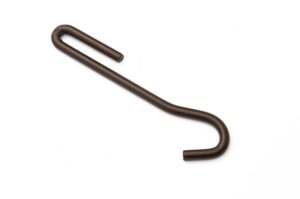※カラフル対訳で紹介している作品はすべてパブリックドメインです。
このサイトで使われている作品のすべては著作権の切れた名作などの全文を電子化して、インターネット上で公開しているProject Gutenberg(プロジェクト・グーテンベルク)、LibriVox(リブリヴォックス、朗読図書館)の作品を出典としています。
翻訳者:satoyayo4080
The Fidgit: “Alas! no. I would willingly if I could; but he is hardly ever seen by ordinary fish.
フィジット:「ああ、残念です。できればそうしたいのですが、彼は普通の魚にはとても見つけられません。
He lives at the bottom of the Deep Hole, and seldom comes out—And into the Deep Hole, the lower waters of which are muddy, fishes such as we are afraid to go.”
彼は海底の『深い穴』に住んでいて、めったに出てきません。そして、『深い穴』、その下にある水は濁っていて、僕らのような魚には怖くて行けません」
The Doctor: “Dear me! That’s a terrible disappointment. Are there many of this kind of snail in the sea?”
先生:「おやおや!それはひどくがっかりだな。この種のカタツムリは海にたくさんいるのかい?」
The Fidgit: “Oh no. He is the only one in existence,[現存する] since his second wife died long, long ago. He is the last of the Giant Shellfish.
フィジット:「いえいえ。2番目の妻をずっと昔に亡くしているので、今いるのは彼だけです。彼が最後の巨大貝です。
He belongs to[~に所属している] past ages when the whales were land-animals and all that.[やら何やら] They say he is over seventy thousand years old.”
クジラが陸の動物であったり何やらした過去の時代の生き物です。7万歳以上と言われています」
The Doctor: “Good Gracious,[〈感心したり驚いた時の声〉] what wonderful things he could tell me! I do wish I could meet him.”
先生:「いやはや。そいつはどんなにか素晴らしい話をしてくれるんだろう!ぜひとも会いたいものだ」
The Fidgit: “Were there any more questions you wished to ask me?
フィジット:「他にお聞きになりたいことはありますか?
This water in your tank is getting quite warm and sickly.[〈悪臭など〉吐き気を催させる] I’d like to be put back into the sea as soon as you can spare me.”[あなたが私を救えるようになり次第]
この水槽の水がかなり温かくなってきていて、気分が悪くなってきています。できるだけ早く海に戻して欲しいのですが」
The Doctor: “Just one more thing: when Christopher Columbus crossed the Atlantic in 1492, he threw overboard[(船から)水中に] two copies of his diary sealed up[密封する] in barrels.
先生:「もう一つだけ。クリストファー・コロンブスが1492年に大西洋を横断した時、日記の写しを2冊、樽に密封して海に投げたんだ。
One of them was never found. It must have sunk. I would like to get it for my library. Do you happen to know where it is?”
2冊のうちの1冊がどうしても見つからなかった。沈んでしまったに違いない。それを蔵書として手に入れたいんだ。ひょっとして君はどこにあるか知っているかい?」
The Fidgit: “Yes, I do. That too is in the Deep Hole.
フィジット:「わかりますよ。それも『深い穴』にあります。
When the barrel sank the currents drifted it northwards[北方向に] down what we call the Orinoco Slope, till it finally disappeared into the Deep Hole.
樽が沈んだ時、海流が、僕たちがオリノコ坂と呼んでいる 北の方に樽を押し流し、最後には『深い穴』へと姿を消してしまいました。
If it was any other part of the sea I’d try and get it for you; but not there.”
他の海域であれば、何とかして先生のために手に入れてさしあげたいですが、あそこは無理ですね」
The Doctor: “Well, that is all, I think. I hate to put you back into the sea, because I know that as soon as I do, I’ll think of a hundred other questions I wanted to ask you.
先生:「質問は以上だ。きみを海に戻したくないな。海に帰した途端、100個くらいの別の聞きたいことが浮かんできそうでね。
But I must keep my promise. Would you care for anything before you go?—it seems a cold day—some cracker-crumbs or something?”
でも、約束は守らないといけない。行く前に何か食べて行くかい?寒いだろうから、クラッカーのかけらか何かはどうだい?」
The Fidgit: “No, I won’t stop. All I want just at present is fresh sea-water.”
フィジット:「いいえ、すぐに行きます。今はとにかく新鮮な海水が欲しいだけです」
The Doctor: “I cannot thank you enough for all the information you have given me. You have been very helpful and patient.”
先生:「色々と教えていただき、本当に感謝しているよ。君はとても親切で忍耐強かったよ」
The Fidgit: “Pray do not mention it. It has been a real pleasure to be of assistance to[力になる, 助けとなる] the great John Dolittle.
フィジット:「どういたしまして。偉大なジョン・ドリトル先生のお役に立てて、とても光栄です。
You are, as of course you know, already quite famous among the better class of fishes.
もちろんご存じと思いますが、上級階級の魚たちの間では、先生はすでにかなり有名な方ですよ。
Goodbye!—and good luck to you, to your ship and to all your plans!”
さようなら!お達者で。船のご無事をお祈りいたします。ご計画も順調に進みますように!」
The Doctor carried the listening-tank to a port-hole,[(船の)舷窓] opened it and emptied the tank into the sea.
先生は聴取槽を丸窓まで運び、窓を開け、水槽のフィジットを海にうつして空っぽにした。
“Good-bye!” he murmured as a faint splash reached us from without.[《文語》 外,外部]
「さようなら!」と先生がつぶやくと、かすかな水しぶきが向こうの方から聞こえてきた。
I dropped my pencil on the table and leaned back[のけぞる] with a sigh.
私は鉛筆をテーブルの上に落とし、ため息をついて椅子の背にもたれかかった。
My fingers were so stiff[硬直した] with writers’ cramp[(筋肉の)けいれん] that I felt as though I should never be able to open my hand again.
指は文字の書きすぎで筋肉が痙攣してガチガチになり、もう手を開けることができなくなるのではないかと思うほどだった。
But I, at least, had had a night’s sleep.
でも私は少なくとも(昨日)ひと晩は寝ていた。
As for the poor Doctor, he was so weary that he had hardly put the tank back upon the table and dropped into a chair, when his eyes closed and he began to snore.
だけどもお気の毒に先生はと言うと、疲れ切って、水槽をテーブルの上に戻すやいなや椅子に崩れ落ち、目を閉じていびきをかき始めた。
In the passage outside Polynesia scratched angrily at the door. I rose and let her in.
外の廊下でポリネシアが怒ってドアをひっかいた。私は立ち上がり、彼女を中に入れてあげた。
“A nice state of affairs!” she stormed. “What sort of a ship is this? There’s that colored man upstairs asleep under the wheel;
「なんてことでしょう!」と彼女は怒鳴り散らした。「この船はいったいなんなの?上では黒人が舵輪の下で寝ているし、
the Doctor asleep down here; and you making pot-hooks[(S 字型の)自在かぎ] in a copybook with a pencil!
ここでは先生が寝ている。あなたは鉛筆で習字帳に自在かぎ みたいな字を書いているじゃない!
みたいな字を書いているじゃない!
Expect[期待する] the ship to steer[進む] herself to Brazil? We’re just drifting around the sea like an empty bottle—and a week behind time as it is.
船が勝手にブラジルに向かってくれると思っているんじゃないの?船は空瓶のように海を漂っているだけで、1週間も予定が遅れているんですよ。
What’s happened to you all?”
みんな、一体どうしてしまったの?」
She was so angry that her voice rose to a scream. But it would have taken more than that to wake the Doctor.
彼女は怒りのあまり、金切り声になってしまった。しかし、それくらいでは先生は起きなかった[先生を起こすにはそれ以上のことが必要だったろう]。
I put the note-book carefully in a drawer and went on deck to take the wheel.
私は丁寧に引き出しにノートをしまうと、舵を取りに甲板に行った。

